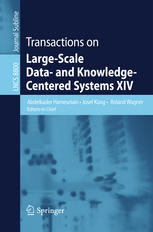

Most ebook files are in PDF format, so you can easily read them using various software such as Foxit Reader or directly on the Google Chrome browser.
Some ebook files are released by publishers in other formats such as .awz, .mobi, .epub, .fb2, etc. You may need to install specific software to read these formats on mobile/PC, such as Calibre.
Please read the tutorial at this link: https://ebookbell.com/faq
We offer FREE conversion to the popular formats you request; however, this may take some time. Therefore, right after payment, please email us, and we will try to provide the service as quickly as possible.
For some exceptional file formats or broken links (if any), please refrain from opening any disputes. Instead, email us first, and we will try to assist within a maximum of 6 hours.
EbookBell Team

4.8
104 reviewsThe LNCS journal Transactions on Large-Scale Data- and Knowledge-Centered Systems focuses on data management, knowledge discovery, and knowledge processing, which are core and hot topics in computer science. Since the 1990s, the Internet has become the main driving force behind application development in all domains. An increase in the demand for resource sharing across different sites connected through networks has led to an evolution of data- and knowledge-management systems from centralized systems to decentralized systems enabling large-scale distributed applications providing high scalability. Current decentralized systems still focus on data and knowledge as their main resource. Feasibility of these systems relies basically on P2P (peer-to-peer) techniques and the support of agent systems with scaling and decentralized control. Synergy between grids, P2P systems, and agent technologies is the key to data- and knowledge-centered systems in large-scale environments. This, the 14th issue of Transactions on Large-Scale Data- and Knowledge-Centered Systems, contains four revised selected regular papers. Topics covered include data stream systems, top-k query processing, semantic web service (SWS) discovery, and XML functional dependencies.